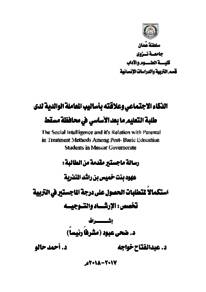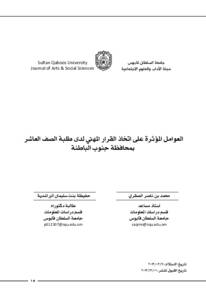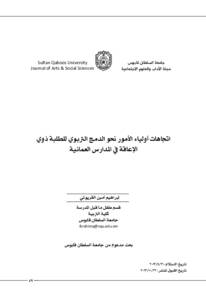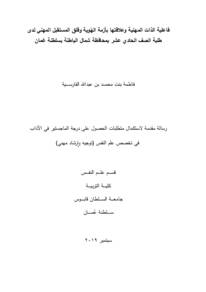Document
الذكاء الاجتماعي وعلاقته بأساليب المعاملة الوالدية لدى طلبة التعليم ما بعد الأساسي في محافظة مسقط.
Publisher
جامعة نزوى
Gregorian
2018
Language
Arabic
English abstract
The study aimed to determine the level of social intelligence and its relation to the parental rearing styles for the students (10-12) in the public schools in Muscat Governorate, (270) students participated in the study and to achieve the objectives the student has used the descriptive approach and implemented two scales: Social Intelligence Scale by Ahmed Alghool (1993) and Parental Rearing Styles by Perris and his collogues (1980).
The study shows that the level of social intelligence for the students in the classes (10 - 12) in Muscat Governorate was high. On the other hand the results showed that the most common parental rearing styles used by parents were the encouraging style, then comes the parental sympathy, then coaching to be better and finally tolerance style. The study also points to the direct relationship between the social intelligence and the following styles: (encouragement, parental sympathy and coaching to be better), whenever the parents use these styles more, the level of social intelligence of their children increases. On the other hand the social intelligence of the children decreases when the styles (deprivation, exclusion and blaming) are used. The study shows statistical differences between male and female students in the social intelligence came for the benefit of the female students. Also there are a statistical differences between male and female students in the parental styles in (Physical abuse, deprivation, cruelty, humiliation, rejection, blame, excessive interference, ostracism, pampering) for male students and the styles (encouragement and parents sympathy) for female students.
The study also shows that there are statistical differences in variables for the grades (10 - 11 - 12) in regard to the social intelligence and these differences came in the benefit of the 11th grade. Results also showed differences for variables of the grades and variables of the parental styles for the 12th grade in the styles (Physical abuse, deprivation, cruelty, humiliation, rejection, blaming, parental sympathy and encouragement).
The study recommends preparation of activities and training sessions assisting in developing the level of social intelligence for the students in schools and emphasizes the importance of designing coaching programs for the parents to develop their skills and methods of increasing their children's social intelligence.
Member of
Resource URL
Arabic abstract
هدفت الدراسة إلى معرفة مستوى الذكاء الاجتماعي وعلاقته بأساليب المعاملة الوالدية لدى طلبة التعليم ما بعد الأساسي (10-12) في المدارس الحكومية بمحافظة مسقط، وبلغت عينة الدراسة (270) طالبا وطالبة، ولتحقيق أهداف الدراسة استخدمت الباحثة المنهج الوصفي الارتباطي و قامت بتطبيق مقياسين:
الأول: مقياس الذكاء الاجتماعي لأحمد الغول (1993)، والآخر: مقياس أساليب المعاملة الوالدية لبيرس وزملائه (1980).
وأظهرت النتائج أن مستوى الذكاء الاجتماعي لدى الصفوف (10-12) بمحافظة مسقط كان مرتفعة، كما أشارت أن أساليب المعاملة الوالدية الأكثر استخدامة من قبل الآباء والأمهات كان أسلوب التشجيع، يليه التعاطف الوالدي، ثم التوجيه للأفضل، ثم التسامح. وأشارت إلى وجود علاقة ارتباطية موجبة بين مستوى الذكاء الاجتماعي وكل من أساليب التشجيع، والتعاطف الوالدي، والتوجيه للأفضل)، فكلما زادت معاملة الأباء والأمهات لهذه الأساليب زاد معها مستوى الذكاء الاجتماعي للأبناء، وتوجد علاقة سالبة في أساليب الحرمان، والنبذ، والإشعار بالذنب)، فكلما زادت معاملة الوالدين لهذه الأساليب انخفض معها مستوى الذكاء الاجتماعي لدى الأبناء، كما أظهرت وجود فروق ذات دلالة إحصائية بين الذكور والإناث لمتغير الذكاء الاجتماعي جاء لصالح الإناث، وتوجد فروق ذات دلالة إحصائية بين الذكور والإناث لمتغير أساليب المعاملة الوالدية في أساليب (الإيذاء الجسدي، والحرمان، والقسوة، والإذلال، والرفض، والإشعار بالذنب، والتدخل الزائد، والنبذ، والتدليل) وهذه الفروق لصالح الذكور، أما أساليب التعاطف الوالدي، والتشجيع) جاءت لصالح الإناث.
وأشارت النتائج أيضا إلى وجود فروق ذات دلالة إحصائية لمتغير الصفوف الدراسية (عاشر- حادي عشر- ثاني عشر) بالنسبة لمتغير الذكاء الاجتماعي، وجاءت هذه الفروق لصالح طلبة الصف الحادي عشر، بينما جاءت الفروق المتغير الصفوف الدراسية مع متغير أساليب المعاملة الوالدية لصالح طلبة الصف الثاني عشر في أساليب (الإيذاء الجسدي، والحرمان، والقسوة، والإذلال، والرفض، والإشعار بالذنب، والنبذ، والتعاطف الوالدي، والتشجيع).
توصي الدراسة بضرورة إعداد بعض الأنشطة والتدريبات التي تساعد في تنمية الذكاء الاجتماعي عند الطلبة في المدارس، وأهمية تصميم برامج إرشادية التي بدورها تسهم في إرشاد الآباء والأمهات بالمهارات والأساليب التي تزيد مستوى الذكاء الاجتماعي لدى أبنائهم.
الأول: مقياس الذكاء الاجتماعي لأحمد الغول (1993)، والآخر: مقياس أساليب المعاملة الوالدية لبيرس وزملائه (1980).
وأظهرت النتائج أن مستوى الذكاء الاجتماعي لدى الصفوف (10-12) بمحافظة مسقط كان مرتفعة، كما أشارت أن أساليب المعاملة الوالدية الأكثر استخدامة من قبل الآباء والأمهات كان أسلوب التشجيع، يليه التعاطف الوالدي، ثم التوجيه للأفضل، ثم التسامح. وأشارت إلى وجود علاقة ارتباطية موجبة بين مستوى الذكاء الاجتماعي وكل من أساليب التشجيع، والتعاطف الوالدي، والتوجيه للأفضل)، فكلما زادت معاملة الأباء والأمهات لهذه الأساليب زاد معها مستوى الذكاء الاجتماعي للأبناء، وتوجد علاقة سالبة في أساليب الحرمان، والنبذ، والإشعار بالذنب)، فكلما زادت معاملة الوالدين لهذه الأساليب انخفض معها مستوى الذكاء الاجتماعي لدى الأبناء، كما أظهرت وجود فروق ذات دلالة إحصائية بين الذكور والإناث لمتغير الذكاء الاجتماعي جاء لصالح الإناث، وتوجد فروق ذات دلالة إحصائية بين الذكور والإناث لمتغير أساليب المعاملة الوالدية في أساليب (الإيذاء الجسدي، والحرمان، والقسوة، والإذلال، والرفض، والإشعار بالذنب، والتدخل الزائد، والنبذ، والتدليل) وهذه الفروق لصالح الذكور، أما أساليب التعاطف الوالدي، والتشجيع) جاءت لصالح الإناث.
وأشارت النتائج أيضا إلى وجود فروق ذات دلالة إحصائية لمتغير الصفوف الدراسية (عاشر- حادي عشر- ثاني عشر) بالنسبة لمتغير الذكاء الاجتماعي، وجاءت هذه الفروق لصالح طلبة الصف الحادي عشر، بينما جاءت الفروق المتغير الصفوف الدراسية مع متغير أساليب المعاملة الوالدية لصالح طلبة الصف الثاني عشر في أساليب (الإيذاء الجسدي، والحرمان، والقسوة، والإذلال، والرفض، والإشعار بالذنب، والنبذ، والتعاطف الوالدي، والتشجيع).
توصي الدراسة بضرورة إعداد بعض الأنشطة والتدريبات التي تساعد في تنمية الذكاء الاجتماعي عند الطلبة في المدارس، وأهمية تصميم برامج إرشادية التي بدورها تسهم في إرشاد الآباء والأمهات بالمهارات والأساليب التي تزيد مستوى الذكاء الاجتماعي لدى أبنائهم.
Category
Theses and Dissertations







